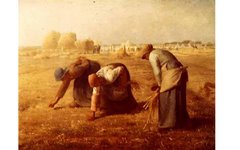Yesterday we went to a book reading by author, Kit Bakke, at a friend's house. Since I haven't read the book, nor have I heard of the author's name before, I thought that it would be a drag to sit through it. Surprisingly, it turned out to be a very interesting event. The stories behind this book project are fascinating.
The book is called "Miss Alcott's E-mail." This Miss Alcott is Louisa Alcott who wrote "Little Women. " I really didn't much about her beyond that. I read "Little Women" long time ago when I was studying English in China. In fact, I don't even remember the plot anymore. Obviously, she is better known as a writer for that book than anything else. Yet Ms. Kit Bakke doesn't even recommend "Little Women" to people who want to learn more about Louisa Alcott. According to her, Miss Alcott's true personalities and values are not reflected through "Little Women" - a big hit of her times.
So, who is this Miss Alcott? Kit's book intends to search for an answer, and in the meantime, she weaves in her own stories of being a young person in the 60s and 70s. It looks at two distinctive time periods - the late 19th century and the 60s and 70s - both are times of significant social changes. In Miss Alcott's time, she lived through the slavery abolition movement and the earliest stage of struggle for women's equal voting rights (In fact, she was the first woman who registered to vote in Concord, the city she lived in.) Kit, the author, was involved in the anti-Vietnam war movement and later became a member of the Weathermen group which was a radical organization with a goal to "bring the Vietnam war home" through acts of domestic terrorism. Kit smartly structured the book in modern day email format so that she and Louisa Alcott can have a dialogue across time zones.
As Kit told us, she was inspired to write this book, her first book ever, after a trip to Europe during the 9'11 week. She was in tears like many others there when all the tour boats on the River Seine in Paris started playing the song "America the Beautiful." She said those emotions compelled her to write about something good about America and the American people. And Louisa Alcott came into her mind while she was lying on a dentist chair after having returned home from Europe.
I think Kit's own stories must have made readers easier to relate to Louisa Alcott, a female writer and activist from a different century. I imagine it would be a real treat to look at Louisa Alcott's life through her eyes.
My Space to Remember, Reflect and Recharge.

Thanks for stopping by!
Life is intriguing, inspiring and, at times, boring too! To take a break from the daily mundane routine, and to pause for reflections, on this blog site, I intend to write about my random diversions as they occur and travel stories when I'm on the road.
My Favorite Links
Blog Archive
-
▼
2006
(19)
-
▼
December
(19)
- Belize Trip: Cave Tubing and Belize Zoo (Day 4, Th...
- Belize Trip, Caye Caulker (Day 3, 12/27, Wednesday)
- Belize Trip: Snorkelling and Exploring San Pedro (...
- Merida to San Pedro, Belize - A Seven-hour Journey...
- Christmas Eve Dinner
- What Day is Today?
- From Winter to Summer
- What Phobia? Haircut Chair-phobia
- Cozying up in front of "Breathless"
- A Quick Glance at Belize - History and Its Peoples
- Merry Merida, Felize Belize – embracing sunshine a...
- Augusto Pinochet, Jean Dominique and “the barrel o...
- At Anchor, yet Oceans Apart
- "Lost" in reality
- Wintry thoughts, wintry memories
- Christmas Tree and Holiday Spirit
- Who is Louisa Alcott? Yours for Reforms of All Kinds
- Sichuan Pepper, Chinese Prickly Ash, Zanthoxylum P...
- The Origins of Hot Pot 火锅
-
▼
December
(19)
Labels
- about blogging (1)
- actor (1)
- advocate (1)
- Asian American (1)
- author (1)
- Belize (8)
- birthday (1)
- childhood (1)
- China (1)
- Christmas (1)
- Chunjie (1)
- cooking (2)
- crime (1)
- cuisine (1)
- Culture (2)
- Da Pan Ji (1)
- diversity (1)
- economics (2)
- economy (1)
- film festival (1)
- Friday (1)
- haircut (1)
- history (2)
- home repairs and improvements (1)
- hot pot (1)
- hua jiao (1)
- Hunan (1)
- International Politics (2)
- Kennedy (1)
- laundry list (1)
- Literature (1)
- maps (1)
- maritime (1)
- memory (2)
- Merida (3)
- mom (1)
- Movie (2)
- musical (1)
- rain (1)
- random thoughts (2)
- recipe (1)
- rewind (1)
- road trip (2)
- Seattle (1)
- Sichuan cuisine (1)
- snow (1)
- snowshoe (1)
- spring (1)
- tea (1)
- travel (3)
- vacation (6)
- weather (3)
- weekend (4)
- Winter (1)
- 大盘鸡的做法 (1)
- 火锅 (1)
- 花椒 (1)